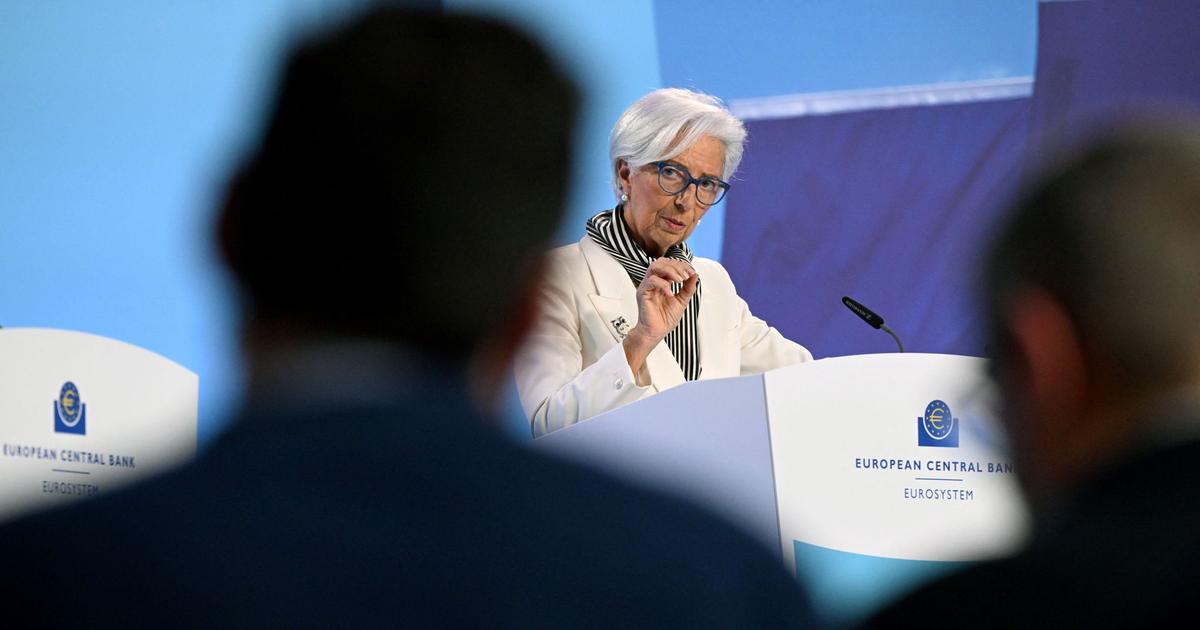The President of the ECB, Christine Lagarde, in Brussels, last February.
REUTERS / Francois Lenoir / File PhotoFRANCOIS LENOIR / Reuters
The Supervisory Board of the European Central Bank (ECB) has agreed to lift the veto on dividends from banks, although it has urged entities not to distribute more than 15% of the accumulated profits of the 2019-2020 years until, at less, September 2021. This limit is well below what was usual before this crisis, which was between 40% and 50% of ordinary profit.
The ECB also limits the dividend to be distributed to not exceed 0.20 points above the level of principal capital, CET 1 if this amount is less than 15% of profit.
The ECB continues to recommend not making any kind of remuneration to shareholders in order to conserve as much capital as possible.
However, the banks that decide to go ahead with the payments will have to assume the imposed restriction and must discuss it with the supervisor, who also prohibits the distribution of dividends on account of the results of 2021. In this sense, he says that they must report their plans January 15 at the latest and they cannot make their position public before checking with the ECB.
In a letter to credit institutions, the ECB has also reiterated its expectations that they will be extremely moderate in relation to variable remuneration for executives during the same period as that foreseen for dividends and share buybacks (30 September 2021).
The supervisor will carefully evaluate the remuneration policies, he warns the banks.
What will happen in September?
That month "if there are no significant adverse circumstances, the intention of the ECB is to repeal the recommendation and re-evaluate the capital and dividend distribution plans of the entities on the basis of the result of the normal supervision cycle", it indicates in the note .
Dividends only for profitable banks
The supervisor justifies this limitation to "the persistent uncertainty about the economic impact of the coronavirus pandemic."
It warns that entities that intend to pay out dividends or buy back shares “must be profitable and have strong capital trajectories.
They are expected to contact their joint oversight team to determine whether the expected level of distribution is prudent. "
Financial sources consider that banks that are in losses due to extraordinary provisions, such as covering goodwill, which is the case of Santander, would not be prevented from distributing dividends, although they must clarify this with the supervisor.
In revising its recommendation, the ECB acknowledges the decrease in uncertainty in macroeconomic projections.
"Despite the current challenges, the revised projections are close to the central scenario used in the vulnerability analysis carried out by the ECB in the first half of the year, which confirmed the resilience of the European banking sector," he explains in the note.
And it clarifies that "the objective of the revised recommendation is to safeguard the capacity of entities to absorb losses and provide support to the economy."
It asks institutions to continue using their capital and liquidity buffers to grant credit and absorb losses.
"The ECB will not require them to start restoring their capital buffers before it reaches the maximum level of decline," he explains to give them more peace of mind.
Frankfurt also considers that it is still necessary to maintain “a prudent approach, given that the impact of the pandemic has not been fully manifested in the balance sheets of entities in a context in which entities continue to benefit from various public support measures and considering that credit impairments occur with a temporary delay ”.
The ECB recommends that national supervisors apply the same approach to the less significant institutions that they directly supervise, so the measure will affect all Spanish financial institutions.
The responsibility lies with the managers
Spanish banks have about six million shareholders who can benefit from this measure.
The ECB has taken the most awaited decision by the financial sector and by many small savers who count on bank dividends as a supplementary income for their economy, although the amount of dividends will be small.
The analyst firms trust that the distribution of dividends will further push the prices of banks, which have risen 47% in November and are 6% in December.
Financial sources see hopeful that the ECB has said that it will review the average in September and that it opens its hand to distribute 15% of the benefits.
However, they also admit that the measure means that bank managers will have to assume responsibility for that measure in the midst of a crisis whose end and depth are uncertain.
The improvement in economic prospects due to the advance in the arrival of vaccines is a factor that banks have also used to be able to distribute dividends.
The ECB is concerned about the increase in non-performing loans as the crisis progresses and the moratoriums on credits that are now activated end.
Finally, there has not been a condition that links it directly to the level of capital.
This would not have favored Spanish banks, which are at the bottom of Europe due to the CET 1
fully loaded
ratio
, which measures the highest quality capital.
This is what was demonstrated in the recent review of banking carried out on November 11 by the European Banking Authority (EBA, for its acronym in English).
Kutxabank, Unicaja and Bankia are the three Spanish entities with the most capital, while Bankinter, Santander and BBVA are at the tail.
Despite these ratios, Santander and BBVA insist that they have a sufficient capital cushion to reward shareholders through dividends or share buybacks without this entailing being exposed to the potential aftershocks of the crisis once the funds are withdrawn. public stimuli and increase bankruptcies of unprofitable or insolvent companies.
The limit is set at these 20 basis points (100 basis points equals one percentage point) of principal.
In 2019, Spanish banks distributed just over 8,000 million euros in dividends, despite the cuts that some entities made when the health crisis broke out.
Santander canceled an interim dividend for 2019 and CaixaBank halved the dividend it was going to deliver on 2019 profits. Bankia also canceled an extraordinary dividend of 2,500 million with which it wanted to pay its shareholders, especially the State that controls 62% of the shares, after achieving a high excess of capital.
The Bank of England already paved the way for the return of dividends last week, when it announced that it would allow the delivery of up to 25% of profits, buybacks of securities and the return of bonuses to managers, although it recommended that the sector go prudent in the face of high uncertainty and avoid rewarding senior managers with excessively high remuneration.
Pressure from the bank to the supervisor
Spanish and European banks have exerted all possible pressure on the Frankfurt supervisor to allow dividends to be distributed because the sector considers that this situation is sinking them on the stock market because they lose interest for the investor.
In Spain, one of the most active entities has been Santander, which stated that the distribution of dividends was a way to reactivate the economy, since it involves injecting money into families and companies.
Santander and other entities also pointed out that if the banks did not distribute dividends they would be forced to cut credit because the cost of the capital they need to grant loans rose.
The Bank of Spain, through the mouth of its governor, Pablo Hernández de Cos, denied this argument and explained that the cost of capital for banks had stabilized after rising at the beginning of the pandemic.
The non-distribution of dividends is another factor that could cancel or reduce the bonus of bank executives, such as those of Santander.
According to Joaquín Maudos, professor of Economics at the University of Valencia, with this decision the ECB has achieved “a difficult balance, only partially satisfying the banks by allowing them to allocate a small percentage of the profit to dividends”.
"The big question is which Spanish banks will be able to pay dividends given that in general they are in the lower part of the solvency ranking and how the Stock Exchange will value this decision," he adds.
Maudos does not believe that there is a possible stigma on banks that do not distribute dividends because "with the information published last week by the EBA there is already a lot of transparent information on the health of each entity."
The last public position of a European body on this issue was the statement of last Friday by the European Banking Authority, when it emphasized that prudent policies are still necessary in terms of the distribution of capital of institutions, despite the fact that they have managed to maintain a strong capital and liquidity position during the covid-19 pandemic.
Prudence in the distribution of capital
"Prudent capital distribution policies are still required" as, despite regulatory relief provided by supervisors and the increase in ratios in the second quarter of 2020, "capital remains under pressure" in the face of revenue contraction operations, which can reduce capital accumulation, while the deterioration of asset quality can erode the capital base and increase risk-weighted assets, the EBA warned after its examination of European banks.
In recent weeks, the ECB itself has opened the door to the option of allowing "bank by bank" to distribute dividends again in 2021. Andrea Enria himself clarified in a letter sent to the Citizens MEP Luis Garicano that the supervisor has with the power to "issue binding requirements related to bank-by-bank [dividend] distributions and, within the scope of the applicable legal framework, it will not hesitate to do so if the need arises."
Previously, Yves Mersch, who has just left the Governing Council of the ECB, warned of the legal difficulties in extending the general ban on distributing dividends, since the mandate of the institution points to a case-by-case approach, which It invited us to think that the final decision will depend on the "conservatism of the internal models of the banks, the conservatism in the provisioning and a solid vision of the capital trajectory of a bank".
Despite these signs pointing to a lifting with terms of the ban, the Irish representative on the Supervisory Board of the ECB's Single Supervisory Mechanism (SSM) and deputy governor of the Central Bank of Ireland, Ed Sibley, was recently in favor of extend the veto on dividends for another six months, although he recognized the legal challenges such a pronouncement from the supervisor would have to face.





/cloudfront-eu-central-1.images.arcpublishing.com/prisa/YS736RHYZRGIRRV66X7MYCGVBU.jpg)









